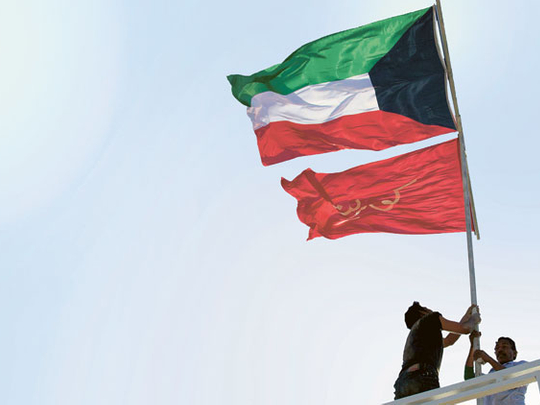
Manama: "I am confident that the brightest and most secure future in the Gulf is here in Kuwait," said Abdullah as he was leaving the mosque.
"You look around and you see problems and a lot of tension. We have it here in Kuwait as was very obvious in December and January and even these days, but it is different from what is happening elsewhere," said the Kuwaiti technician.
Since December, Kuwait has been under intense pressure after people took part in a rally at a local diwaniya (private community halls attached to large houses where men hold weekly meetings to discuss a wide range of issues).
The tension heightened after opposition lawmakers insisted on discussing ways to curtail the powers of the government and to use street pressure to press for their demands.
Anti-riot police clashed with protesters and conflicting reports compounded the situation.
The protesters claimed they were indiscriminately attacked with batons. The police however, said they dispersed the crowd.
The consequences were painful for all parties and eventually the parliament had to vote on whether the prime minister should continue to lead the government. The government won, but very narrowly. For the opposition, the close contest meant that their cause had gained ground and that they should not stop.
The pro-government and anti-government lawmakers have become strange bedfellows.
February, a month of massive national and independence celebrations, has delayed new probable clashes.
But, for Abdullah, the expected standoff will not hurt the country.
"Kuwait has come a long way and the various problems have in fact steeled the people. They can now take on challenges with confidence and come out stronger," he said.
"The society is obviously divided. We have the city people and the Bedouins. We also have the bidoon, the stateless people. And then, we have Sunnis and Shiites. We have to look at this diversity as an opportunity to enrich Kuwait. They might have some problems, but these are minor and most of them are looking forward to a better future together," he said.
In May 2009, Mohammad Al Juwaihal, a candidate from the third constituency that has a unique combination of "Urbans", Bedouins, Sunnis and Shiites, told supporters that he asked the public prosecutor to reveal the names of Kuwaitis holding a double nationality and deport them out of Kuwait.
His statement sparked a fire that has not been put out yet.
Al Juwaihal devoted his time, energy and money to prove his point and pushed his campaign to the point of launching a television station "Al Soor", the Wall, in reference to the wall that surrounded Kuwait City and made the social difference between the "Urbans" who lived inside and the Bedouins who lived outside.
"Al Juwaihal made a point by throwing the stone in the water, and whether we agree with him or not, the ripples widened to a large effect," Mohammad Al Suhaili, a Kuwaiti retiree, said.
"Kuwait now needs to tackle this mindset that seems so keen on dividing the nation. There are many people who think like him and no matter how much leaders talk about national unity, we must not forget that there are people who put their family origin first and above the nation," said Al Suhaili who lives in Manama.
For him, the greatest threat is posed by radical religious figures.
"Kuwait used to lead the Arabian Gulf in cultural and literary activities. It was a highly vivacious society and a focal point for all forms of art that rivalled Cairo and Beirut. However, when the parliament became dominated by politicised religious figures, several things changed and Kuwait gradually slid into another way of life. It was simply the death of literary and art events. When people were talking about how to move forward in building a vibrant society, our parliament focused on trivial issues and on how to impact society according to the views," he said.
Bright future
According to Al Suhaili, the future nevertheless looks bright.
"Parliament has improved thanks to the presence of women and better cooperation by forward-looking forces. The government is keen on turning Kuwait into a hub. Ministerial changes are on the cards to enhance the government performance and ease tension. Now, a good combination of all these factors should usher in a new-look Kuwait where people can recover or see for the first time, in the case of youngsters, real modern life where harmony or at least peaceful co-existence is the key word, not confrontations or escalation of tension," he said.










